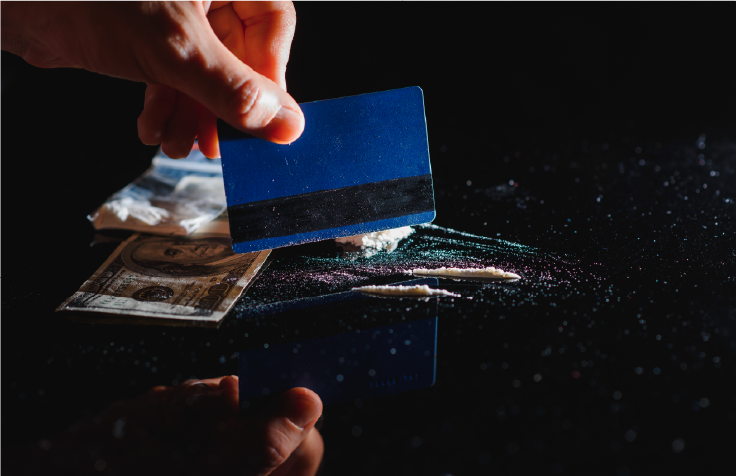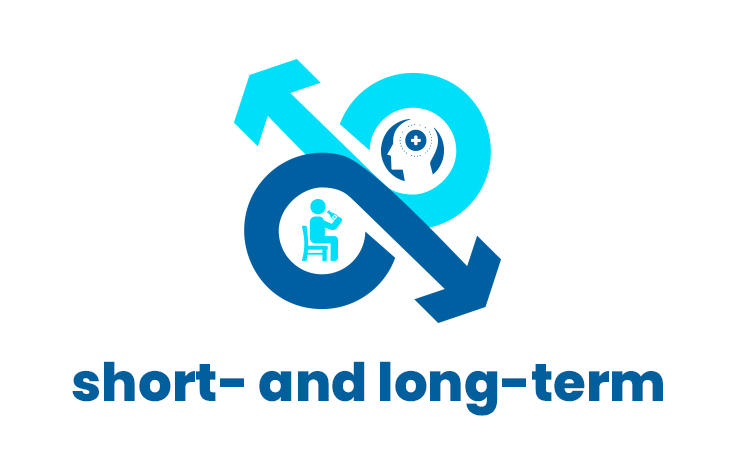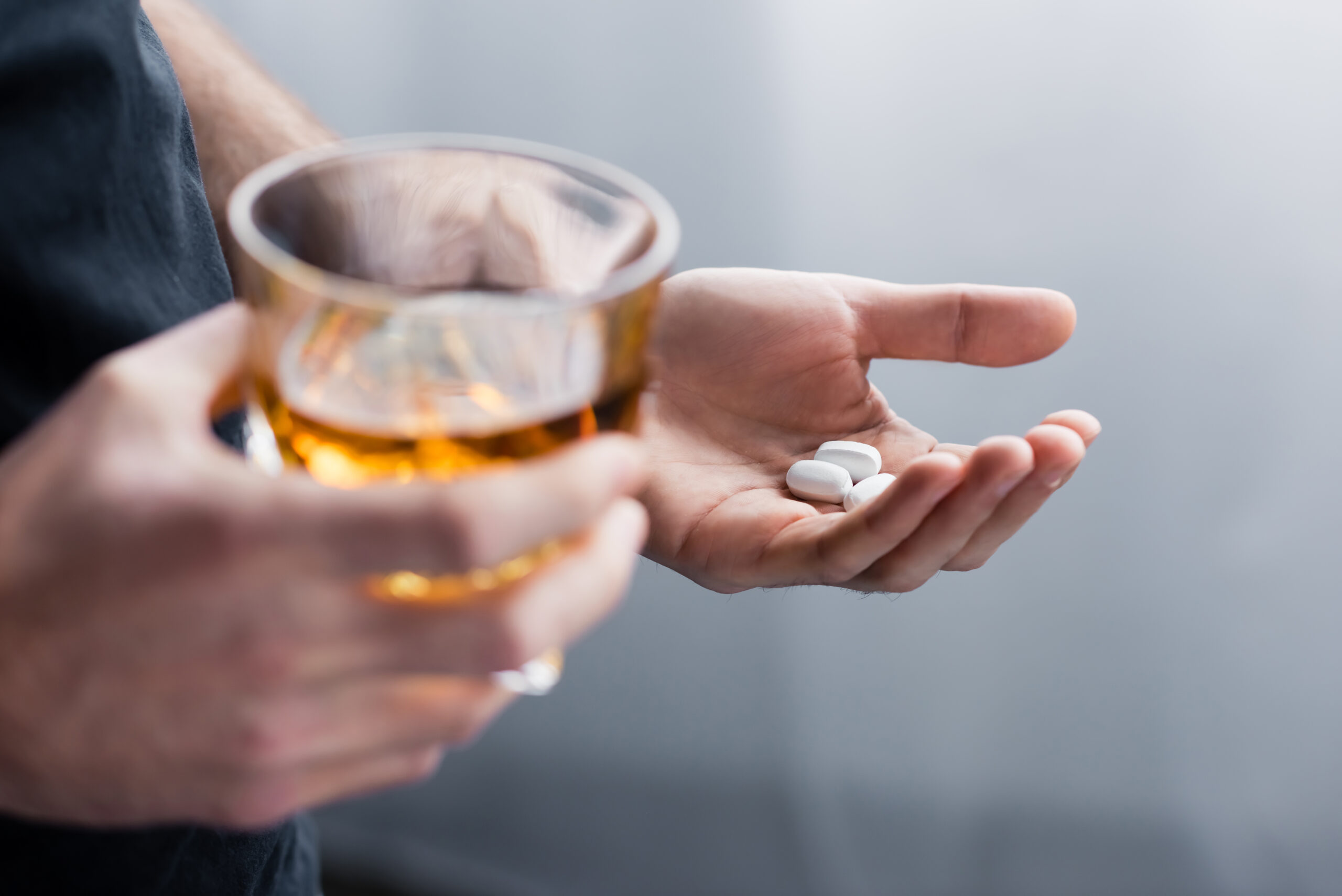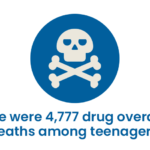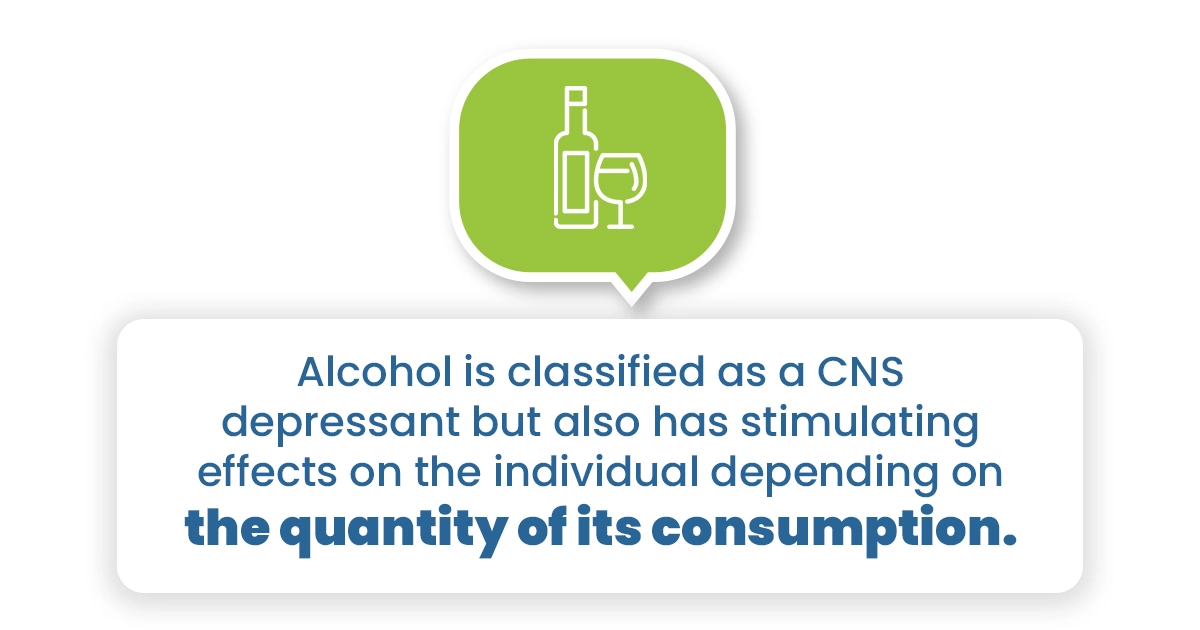
Alcohol is a widely used substance and a depressant to the CNS. Individuals face various health problems if they excessively drink or depend on alcohol. Alcohol affects brain functions and increases the production of dopamine.
The high production of an inhibitory neurotransmitter, GABA or gamma-aminobutyric acid, slows brain functioning. Alcohol also reduces other activities of other vital organs in the human body. You will experience the depressant effects if you consume alcohol in large quantities.
If you are drinking heavily, then you are most likely to develop a substance use disorder (or alcohol use disorder, which is also known as alcoholism). However, if you consume alcohol in a moderate quantity, you will likely experience a sedative effect.
Key Takeaways
This article will provide you with information about what kind of drug alcohol is:
- Ethanol is the primary product in the manufacturing of alcohol, and by the process of fermentation, it is converted into alcohol.
- Alcohol is classified as a CNS depressant but also has stimulating effects on the individual depending on the quantity of its consumption.
- If you are drinking alcohol in large quantities, it leads to alcohol addiction which is both a physical and psychological addiction.
- If you try to quit alcohol, it causes an alcohol withdrawal syndrome. Medical supervision is required after this.
- Treatment facilities offer individuals the way to go through alcohol withdrawal in the most convenient way for them.
We at The Have Detox-South Florida help you recover from alcohol addiction. Call and share your concerns with us at (561) 328-8627.
Alcohol
Alcohol is a central nervous system (CNS) depressant. In the United States, alcohol consumption is common and causes several deaths. Alcohol is also a drug that has both stimulating and depressing effects on the individual.
Most commonly, alcohol includes wine, beer, and liquor, and there are many other alcoholic beverages as well. It gives feelings of pleasure and relaxation to an individual. In this way, they sometimes abuse alcohol, leading to alcohol use disorder (AUD).
Alcohol is legal in many parts of the world. Hence, it results in a large number of cases of alcohol use disorder. Young people mostly enjoy alcohol in social gatherings, that is where the addiction problem starts.
How Alcohol is Made
Ethyl alcohol is the primary ingredient in liquor, beer, and wine, which makes you feel drunk. For alcohol processing, two main ingredients are used, carbohydrates and yeast.
According to the standards set by the National Institute on Drug Abuse, a standard alcoholic drink is one with 1.5 ounces of distilled spirit or liquor, malt liquor 8 ounces, 12 ounces of beer, and 5 ounces of wine. There is a range of alcohol from two percent to 20 percent in alcoholic drinks. The more high-quality drinks, the more alcohol content increases. Ranging from 40 to 50 percent.
Alcohol’s Classification as a Drug
Alcohol is classified as a depressant drug to CNS. When you start drinking, this will decrease the activity of the central nervous system and slow down brain functioning. Moreover, it also decreases the coordination between the brain and different body parts.
Increased production of GABA, an inhibitory neurotransmitter, leads to a decrease in the functioning of various other essential systems in the human body. Depressant effects become harmful for you if you continue uncontrollable drinking. This is because the quantity you are consuming exceeds the normal quantity tolerated by the body.
Depressant Effects of Alcohol
Some of the depressant effects of alcohol include:
- Sedation
- Slurred speech
- Delayed response time
- Distorted perceptions
- Lack of coordination between the brain and different body parts
- Cognitive impairments
- Distorted judgment
- Unsteady gait
Stimulating Effects of Alcohol
Along with being classified by clinical professionals alcohol is a central nervous system (CNS) depressant. Alcohol also has some stimulating effects on the body’s central nervous system. When you are consuming alcohol in a moderate quantity, then it shows stimulating effects on the body. The following are some stimulating effects of alcohol on the body:
- Euphoria
- Talkativeness
- Mood improvement
- Increased heart rate
- Increased blood pressure
- Carelessness
It does not matter which alcoholic beverages you are misusing. Long-term use of alcohol can cause severe side effects on your mind and body. Some common physical and psychological side effects are distorted judgment and cognitive impairment.
According to an article published in the Behavioral Neurobiology of Alcohol Addiction, those individuals who face strong stimulating effects are more likely to develop the alcohol use disorder in them. Moreover, those individuals who don’t develop alcohol dependence will experience increased sedative effects.
Many other factors lead to alcohol use disorder, such as environmental, familial, and genetic factors.
Alcohol Use Disorder (AUD)
When you are in a state where you can’t stop alcohol consumption or it is difficult for you to control your drinking habits, this is called an alcohol use disorder. In the United States, approximately 17.6 million individuals have suffered from this chronic disease of an alcohol use disorder, as alcohol is one of the most addictive substances which people consume on a regular basis.
Psychological or Physical Reasons for Alcohol Addiction
The physically addictive component of alcoholism is relevant because drinking increases the creation of endorphins and dopamine, which creates euphoria. According to information from the National Institute on Alcohol Abuse and Alcoholism, inherited factors may also impact how each person’s brain reacts to alcohol.
This study shows that some people are more likely to acquire an alcohol consumption disorder than others because they respond to alcohol by generating more pleasant chemicals in their brains.
Many drinkers are unaware that alcohol can change how the brain works and reacts, which is a major contributing element to the development of alcohol dependence. The reward and pleasure centers of a person’s brain become overloaded when they regularly use alcohol, which results in the desire to consume more and more. Even if you want to, you still can’t because your impulse control and judgment are impaired
This also increases the chances of relapse when they try to quit alcohol. There is a long process in the development of AUD, when you start alcohol consumption just for pleasure, then you do alcohol abuse, and it turns into alcoholism.
Social Drinking Can Cause Alcoholism
Alcohol is a dangerous drug and can result in AUD. You can identify where the drug abuse problem initiates. Mostly, people start drinking alcohol because of social influence.
Initially, alcohol gives them pleasure, but it leads to alcoholism or alcohol use disorder if they don’t control the habit. To determine whether you could have an alcohol issue, ask yourself these questions:
- When you can’t get your usual alcohol, do you want to drink more?
- Do you conceal alcohol or exaggerate how much you consume?
- Is drinking having an impact on your finances?
- Has your drinking caused problems in your relationships?
- Have you ever experienced a drunken coma?
- Do you fantasize about your next drink and have a constant alcoholic craving?
When you respond to them, you or someone close to you likely has a significant drinking problem. If children are exposed to alcohol-related problems, counselors are available for help.
Alcohol’s Impact on the Body
Approximately 20 percent of alcohol consumed afterward enters the bloodstream through the stomach. About 80 percent of the leftover alcohol travels through the small intestine before entering the brain, depressing the nervous system.
The liver can only process moderate alcohol in an hour so as an individual’s body starts to absorb alcohol, it gradually loses the ability to continue. An increased blood alcohol concentration from excessive or continuous drinking spreads all across the body, which leads to intoxication.
Alcohol’s depressive effects gradually take control of the body, making it challenging to think, move with precision, or, in the worst cases, stay conscious. The following are some of alcohol’s immediate effects:
- Loss of inhibition
- Vomiting
- Nausea
- Alcohol poisoning
- Lack of coordination
- Slurred speech
- Impaired judgment
The following are the long-term effects of alcohol on the human body:
- Stroke
- Brain damage
- Depression
- Liver disease
- Increased blood pressure
- Increased risk for cancer
Alcohol Poisoning
If alcohol is occasionally used in small amounts and at low levels, there are fewer health hazards, troubling symptoms, and consequences. However, if you start drinking heavily or in large amounts for a short period, there are several concerns that you should be aware of.
For example, drinking too much alcohol can lead to alcohol poisoning, which is an alcohol overdose. Alcohol poisoning depresses the CNS, which can have negative effects, including:
- Vomiting
- Toxicity
- Clammy or cold skin
- Inability to feel pain
- Respiratory depression
- Irregular breathing patterns
- Blue-colored skin
- Death
The risks that overconsumption of alcohol can pose to your health are:
- Liver disease
- Heart disease
- Fatty liver
- Memory loss
- Alcoholic hepatitis
- High blood pressure
- Thiamine or Vitamin B deficiency
- Difficulty in understanding
- Stroke
In addition, people continue to abuse alcohol which causes alcohol addiction, despite being aware of the adverse side effects on the human body.
Alcohol Withdrawal
When you try to quit alcohol consumption, you will experience withdrawal symptoms during the process. This condition is referred to as Alcohol Withdrawal Syndrome (AWS) when you start decreasing the amount of alcohol.
The withdrawal symptoms of alcohol vary from one individual to another. These symptoms also depend on the physical and psychological conditions of the body. Following are some of the alcohol withdrawal symptoms:
- Seizures
- Hand tremors
- Delirium tremens
- Nausea
- Insomnia
- Anxiety
You should avoid going cold turkey, trying to stop consuming alcohol on your own. When you want to quit alcohol, seek medical advice from your medical review officer. For example, if you suddenly stop drinking alcohol, this can cause various health issues in the body.
You might experience feelings of discomfort. An alcohol treatment center offers you great medical support and alcohol treatment options. Alcohol is the most widely used drug. That’s why the ratio of alcohol misuse and drinking problems is high in the United States.
Some prescription medications are recommended by healthcare providers for substance abuse to manage alcohol withdrawal symptoms.
Treatment Options for Alcohol Use Disorder
It is a proven fact now that alcohol (ethyl alcohol) is a CNS depressant (a depressant drug), and long-term use of alcohol causes a higher risk for AUD. The Haven Detox-South Florida offers different services in which we provide proper treatment for alcoholism or any other drug problem related to mental health.
The treatment methods for alcohol use disorder in young individuals (teens) and adults are:
- The rehabilitation process includes detox, inpatient rehab, and outpatient treatment
- Therapies are also addiction treatment programs, as medical professionals and counselors are available for counseling
- Prescription medications help in recovering from alcohol addiction withdrawal symptoms
- Support groups can assist you in your recovery journey
Frequently Asked Questions (FAQs)
Is alcohol a depressant drug?
Alcohol is a depressant to CNS. Alcohol consumption changes an individual’s mood and behavior, and neuropsychological functioning.Most of the time, people assume drinking alcohol is a source of pleasure and relaxation. However, its effects result in stress and anxiety in an individual.
Alcohol slows down the functioning of the brain and nervous activities too. Alcohol increases the production of GABA, which slows down the activity of various systems in the human body. Alcohol also affects thinking and impairs judgment too.
The CNS faces depression if you consume alcohol in large quantities as time passes, resulting in respiratory failure.
Which type of drug is alcohol an example of?
Alcohol is classified as a depressing drug that hinders the activity of the central nervous system. There is a decrease in the coordination between the brain and parts of the body. When you do drug use, then there is a certain safe level. However, drug usage always carries a risk to your health.You should have to be very careful when using any drug. Alcohol affects your overall health. You will experience trouble focusing on simple things or tasks. Overdosing with a specific drug can cause various adverse symptoms. These symptoms can be treated with treatment options for alcoholism.
What type of category is alcohol?
Alcohol is classified as a depressant drug. If you start consuming alcohol, it causes major changes in the body due to changes in brain functions. Alcohol consumption induces the production of GABA in the body, which lessens the activity of other systems in the body.The intake of large quantities of alcohol in the body leads to depression in the individual. Alcohol is a clinically proven depressant, but it has stimulant effects too on an individual.
According to the information, individuals who develop AUD experience great stimulating effects. Alcohol consumption is harmful, and you can go for treatment to overcome it.
Is alcohol a drug?
Alcohol is a highly addictive drug, and if consumed in large quantities, it leads to alcohol addiction. Alcohol is categorized as a depressant, but it depends on the quantity consumed whether it has depressant or stimulating effects on an individual.If you overdose, it will have increased depressing effects. These depressive effects include vomiting, inability to feel pain, unconsciousness, coma, or even death.
Get Help from The Haven Detox for Alcohol Addiction
In the United States, alcohol use disorder is expected because of frequent alcohol use. Alcohol use disorder is a treatable condition, and you can find the right treatment plan at The Haven Detox-South Florida rehab facility.
We have certified medical professionals and specialized facilities for addiction treatment. Our services help you in recovering from alcohol abuse. We offer detox and residential treatment for recovering from alcohol addiction.
Contact us at (561) 328-8627 for any questions about addiction treatment.


